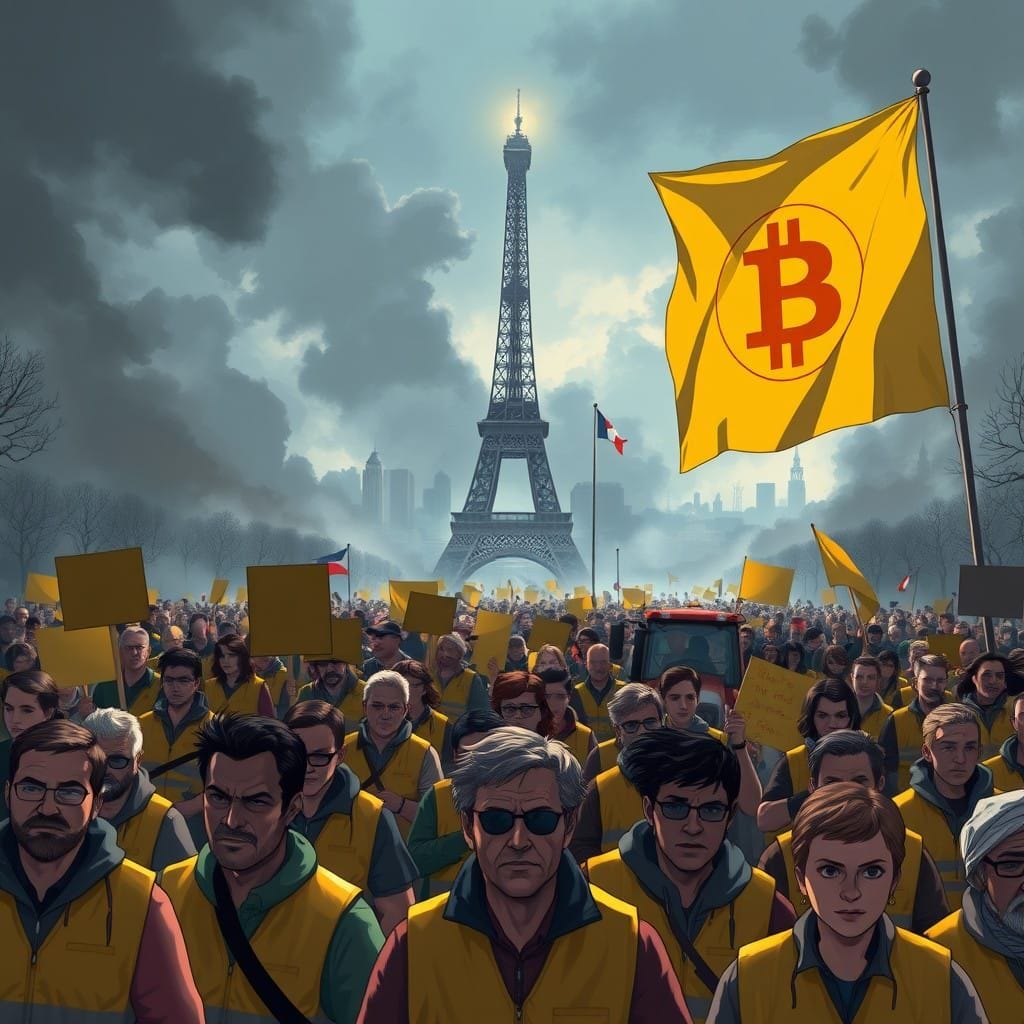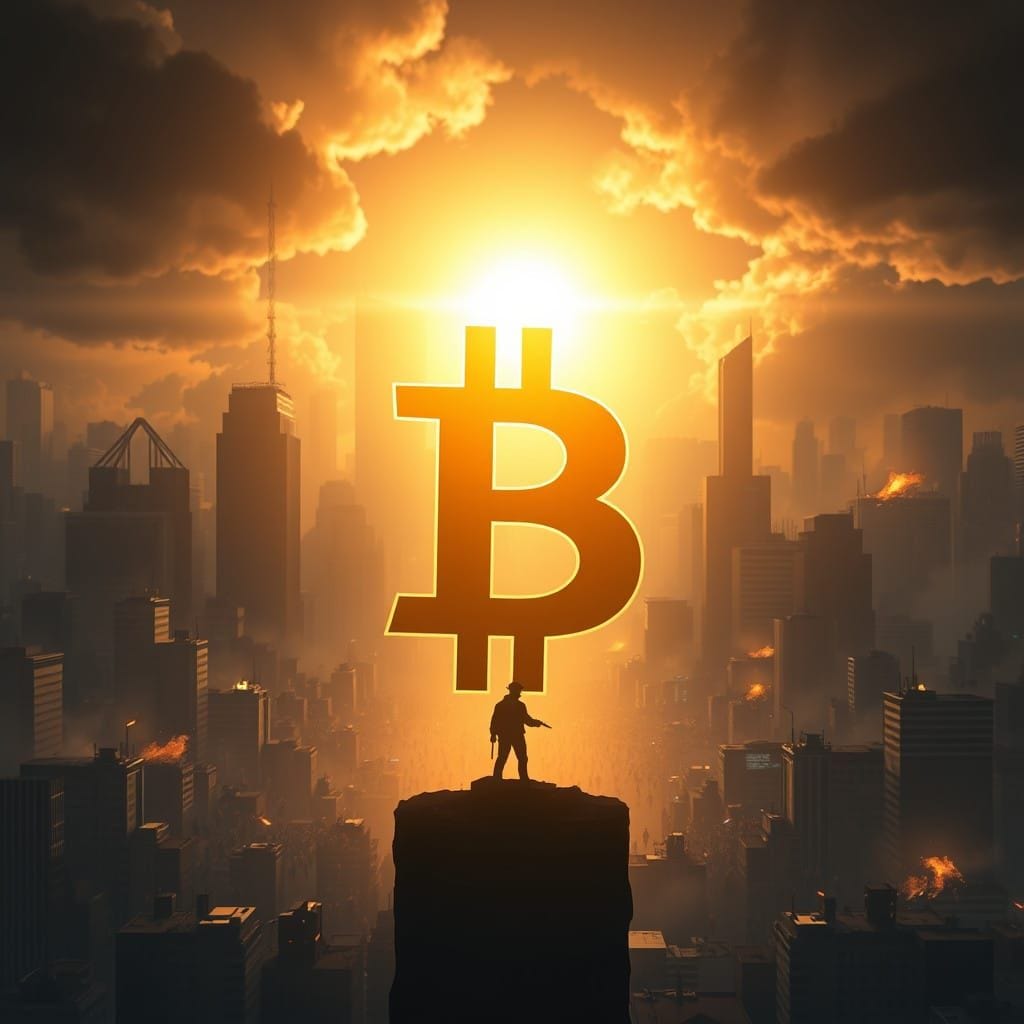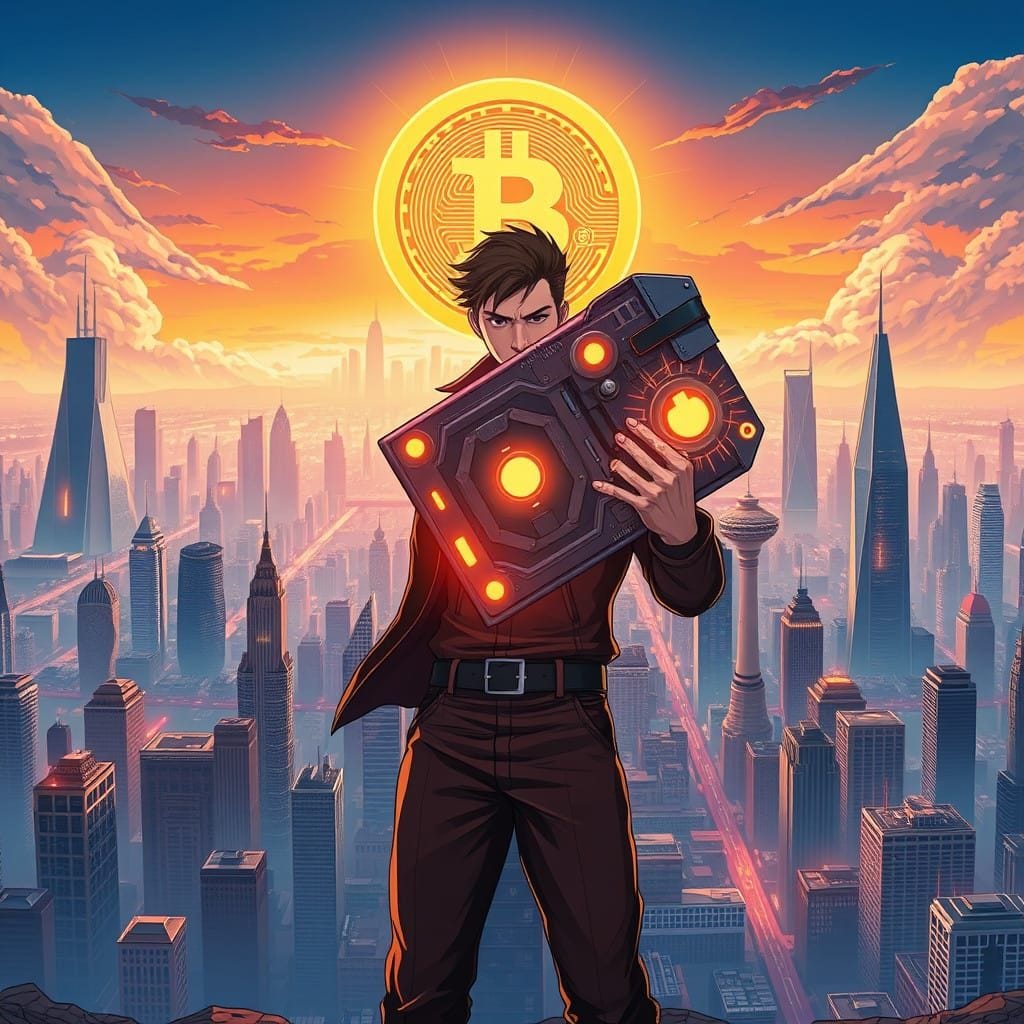Financial Freedom in a Time of Collapse: Bitcoin’s Global Role
Bitcoin: Beyond the Bull Market
With Bitcoin firmly in a bull market and the price once again knocking on the door of $100K, it's easy to forget the real utility of owning Bitcoin. Beyond its "number go up" technology, in a world where governments and big corporations hold vast amounts of power and influence over every aspect of our lives, the need for a store of wealth that exists outside the grips of that power structure is becoming more apparent with each passing day.
Let's talk about the real value proposition of Bitcoin.
Bitcoin looks bullish once again today as it climbs back up toward the mythical $100K level. In the Bitcoin ecosystem, whales refer to individuals or entities that hold a large amount of Bitcoin. The term originates from the idea that, like a whale in the ocean, these holders are massive compared to the smaller "fish" in the market. ETFs, corporations, and large whales continue to stack large sums of Bitcoin. During the latest dip, whales accumulated over 16,000 Bitcoin—or $1.5 billion worth. Now, there remains a huge sell wall in and around the $100K price level, but if demand continues, we will pick away at it. It’s just a matter of time before we tear down the wall and break above $100K.
But with Bitcoin’s bull market about to start and the vibes high, it's easy to forget the true value a system like Bitcoin provides.
Financial Censorship in Focus
Few people meditate about financial censorship and the government's ability to use raw power and influence to financially censor whomever they want.
The unbanking of certain people has all ready been implemented : Individuals or companies are literally kicked out of the banking system for their political beliefs, and employees have been debanked for holding “unacceptable” opinions.
Under current banking regulations, there's a category called a "politically exposed person" (PEP). Financial regulators require banks to remove PEPs from their systems. The system is often biased, with individuals on one side rarely, if ever, facing the same treatment as the other side. Those affected lose access to bank accounts, credit card transactions, and other basic financial tools.
A System of Raw Administrative Power
The issue stems from the interplay of government and private banks. The government pressures private institutions to act, allowing officials to claim they didn’t directly intervene. It’s a sleight of hand that privatizes sanctions and allows unaccountable bureaucrats to impose restrictions akin to those used against foreign adversaries like Iran.
In the past, this financial censorship has disproportionately targeted crypto entrepreneurs, tech founders, disfavored startups or people protesting against their government. This power to restrict access to banking has far-reaching implications. Without due process, people can lose their ability to pay rent, cover mortgages, or buy food. And you never know, this could happen to you in the near futur.
The Canadian Trucker Protest: A Case Study
In early 2022, the Canadian government forced banks to freeze the accounts of citizens who donated as little as $20 to the trucker protests. Those who used regulated platforms like GoFundMe or GiveSendGo were vulnerable. Meanwhile, Bitcoin donations—when properly self-custodied—remained untouchable.
France and Europe
In France and everywhere in europe, everything is accelerating.
Farmers are blocking the roads, their tractors forming walls of resistance across the nation.
The gilets jaunes are back, angrier than ever, promising actions that will shake the streets of Paris and beyond.
Workers are rising up, fed up with a historic wave of layoffs and declining conditions that leave no industry untouched.
And businesses, big and small, are bracing for an economic storm—a recession that feels inevitable, brutal, and imminent.
The National Assembly is paralyzed, teetering on chaos, while the government hangs by a thread, facing the very real possibility of collapse.
Imagine Greece in the 2010s—where pensions were gutted, savings evaporated, and despair became a daily reality. This is not just a possibility for France—it’s a looming certainty. The markets, which have sustained France’s economy for decades, could abandon us in a single day, cutting off the flow of cheap money and sending interest rates soaring.
And it’s not just the economy at risk—it’s the very structure of our society. The collapse of the French system is no longer a distant fear—it is happening in real time. Healthcare, pensions, savings, real estate—all are tied to a system that is breaking apart.Even the once-secure middle class, who believed they were shielded, are realizing they are next. No one is exempt from the fallout.
Across Europe, similar unrest is unfolding. In Spain, farmers are flooding the streets with their tractors in protest, demanding action as droughts and economic hardships push them to the edge. In Italy, workers are organizing massive strikes in response to soaring unemployment and economic instability, while the government struggles to address the growing discontent. Meanwhile, in Germany, the cost of living is spiraling, leading to waves of protests as citizens take to the streets, voicing their frustration with rising inflation and a collapsing social safety net. The European Union’s economic model is facing a breaking point, and no country seems immune. From the Netherlands to Poland, the signs are clear: a major reckoning is at hand. Just as Greece experienced in the 2010s, Europe now stands on the brink of a systemic collapse, where the promise of social safety nets fades, leaving entire populations questioning their future security. Even the wealthier classes, once secure, are seeing their stability unravel. In the face of this upheaval, the structure of European society is no longer just under strain—it’s fracturing in real time.
Bitcoin: The Shield Against Financial Tyranny, Censorship and Economic collapse
But amid the chaos, there is hope.
For the first time, there’s a way to escape the system—a way to store value beyond the reach of collapsing institutions, failing banks, and inflation that eats away at everything.
Bitcoin offers sovereignty to the French people as much as to anyone around the world, allowing them to opt out of a system that no longer works for them. It’s not just a tool for survival; it’s a beacon of hope for rebuilding something better.
Because Bitcoin doesn’t just represent money—it represents freedom. In a world where control is slipping away from the individual, Bitcoin gives it back. It allows farmers to preserve the value of their labor, workers to save without fear, and families to protect their futures against the coming storm.
For those who anticipate what’s coming, Bitcoin is not just an option; it’s a necessity. It’s the foundation of a new France—one built on resilience, sovereignty, and hope.
Bitcoin’s role as a censorship-resistant tool lies at the heart of its design. It empowers individuals to maintain financial sovereignty and resist tyranny, particularly in situations where governments or institutions use financial systems as a tool of control or exclusion.
1. Decentralized Nature
Bitcoin operates on a decentralized blockchain network, meaning no single authority (like a government or corporation) controls it. Transactions are verified by a global network of miners, making it nearly impossible for any entity to block or censor them.
Why It Matters: In centralized financial systems, governments can freeze bank accounts, block payments, or seize funds. Bitcoin, however, enables peer-to-peer transactions without intermediaries, ensuring uninterrupted access to funds wherever you are in the world.
2. Unbanking and Financial Exclusion
In many regions, individuals or groups are denied access to traditional banking systems due to political affiliations, social status, or arbitrary criteria. Examples include activists, political dissidents, or marginalized communities, but it could be as simple as your bank deciding you are untrustworthy without further notice.
Bitcoin's Role:
Anyone with internet access can participate in the Bitcoin network, regardless of location, identity, or background.
It provides an alternative to those excluded from traditional financial systems, allowing them to send, receive, and store value securely.
3. Censorship Resistance
Bitcoin’s cryptographic and decentralized infrastructure ensures that no entity can interfere with transactions.
Real-World Examples:
Canadian Trucker Protests (2022): The Canadian government froze the bank accounts of individuals who supported the protests. Bitcoin donations, on the other hand, allowed supporters to bypass government restrictions and aid the cause without fear of financial retribution.
Activists in Authoritarian Regimes: Bitcoin has been used by activists in countries like Belarus, Venezuela, and Nigeria to fund their movements when governments have suppressed their access to traditional financial tools.
4. Protection Against Debanking
Debanking occurs when individuals or entities are denied access to banking services, often due to political reasons or perceived risks.
Bitcoin's Advantage:
Ownership of Bitcoin is secured by private keys. As long as you control your private keys, no government or institution can confiscate, freeze, or deny access to your funds.
It operates outside the jurisdiction of traditional banks, making it impervious to debanking attempts.
5. Safeguard Against Tyranny and Hyperinflation
In countries with corrupt governments or collapsing economies, Bitcoin provides a hedge against authoritarian overreach and economic mismanagement.
Examples:
Venezuela: Amid hyperinflation and currency devaluation, many Venezuelans turned to Bitcoin as a stable store of value and a means to purchase necessities internationally.
Turkey: When the Turkish lira experienced massive inflation, Bitcoin adoption spiked as people sought to preserve their wealth.
6. Transparency and Trust
The Bitcoin blockchain is publicly accessible and immutable. Unlike traditional financial systems, it operates transparently without the need for trust in third parties.
Why It’s Crucial:
Governments often use opaque systems to surveil and control financial activities. Bitcoin’s ledger ensures accountability while protecting user privacy through pseudonymity.
7. Empowering Grassroots Movements
Bitcoin allows for grassroots fundraising and financial support for movements or causes that may be deemed controversial by authorities.
Examples:
Hong Kong Protests: Protesters used Bitcoin to circumvent financial crackdowns.
Ukraine (2022): During the Russian invasion, Bitcoin donations helped fund humanitarian efforts and resistance.
8. Self-Sovereignty
Bitcoin reinforces the idea of self-sovereignty—the right to control one’s own assets without reliance on external entities.
Features Supporting Sovereignty:
Private Key Ownership: Holding your private keys ensures only you can access your funds.
Censorship-Resistant Transactions: Payments cannot be blocked or reversed by any intermediary.
9. Challenges and Limitations
While Bitcoin offers robust censorship resistance, there are practical challenges:
Education: Many people are unaware of how to securely use Bitcoin, particularly in oppressive regimes.
User Anonymity: Although Bitcoin is pseudonymous, advanced surveillance can sometimes link transactions to individuals. This is why you need to educate yourself on how to use privacy-enhancing tools like the Lightning Network or CoinJoin, and a number of freedom tech solutions flourishing as I write those lines.
Why Self-Custody Is Essential
Bitcoin held on an exchange or within an ETF is inherently vulnerable because it relies on third-party custody, just like depositing cash into a bank. In such cases, your assets are not fully under your control. Exchanges, brokers, or custodial platforms can face hacking attempts, regulatory actions, insolvency, or even direct government orders to freeze or seize funds. This creates a single point of failure, exposing your wealth to risks beyond your control.
True security with Bitcoin lies in self-custody—holding your Bitcoin in a wallet where you alone control the private keys. Private keys are cryptographic tools that grant access to your Bitcoin. When you have sole ownership of these keys, no government, corporation, or intermediary can interfere with your holdings. Self-custody ensures that your Bitcoin is immune to external freezes, confiscations, or censorship.
In today’s world, where financial censorship and government overreach are becoming alarmingly frequent, self-custody offers unparalleled protection. This doesn't mean putting all your wealth into Bitcoin, but allocating a portion of your portfolio to Bitcoin under your direct control is a prudent strategy. It acts as a hedge against the unpredictability of centralized systems and gives you peace of mind knowing your wealth is truly sovereign.
Bitcoin operates on the world’s most secure and censorship-resistant network. By decentralizing control, it eliminates reliance on trust in any single entity. As the world undergoes a significant economic transition toward 2030—with increasing debt, inflation, and institutional instability—Bitcoin stands out as a beacon of financial freedom and resilience. Self-custody transforms Bitcoin from a speculative asset into a powerful tool for long-term financial sovereignty and protection against systemic collapse.
Source & inspiration : Swan Bitcoin






